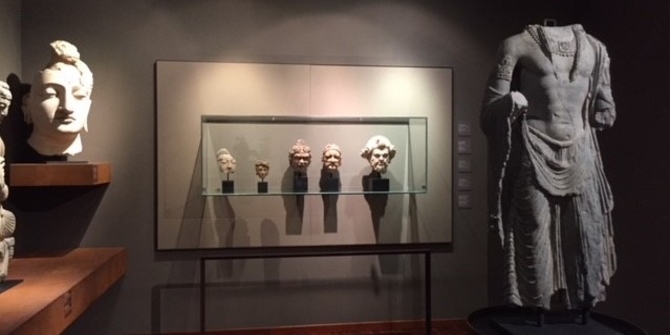Reiki, an offshoot of the international movement of ‘new’ age spiritual practices, has become increasingly popular with certain women in Delhi. Ujithra Ponniah (Tata Institute of Social Sciences (TISS), Hyderabad) argues that its rise symbolises the needs of some women who struggle to deal with the problems of well-being in the family, divorce, problems with mothers-in-law, and material success. But crucially doing so without questioning the unequal structures of caste patriarchy and the tightly-knit relationships in the Hindu joint family.
 A person holding a string of lights | Creidt: Unsplash, @jdiegoph
A person holding a string of lights | Creidt: Unsplash, @jdiegoph
Why is there a rise in new age spiritual practices in urban India? Why do women constitute a sizeable share of the participants? My ethnographic study amongst ‘upper’ caste and middle class women in Delhi attending Reiki classes found that women learn to adjust to be productive in congested joint family settings through the practice of new age spiritualities. Reiki in India as a ‘new’ age spiritual practice is an offshoot of the international movement to spread Reiki. In recent years newspapers and blogs have carried articles and accounts about the potential Reiki has in solving interpersonal problems. ‘New’ age spiritual practices crowding the urban Indian market are a mix of religiosity, self-care and therapy. Scholars prefix the word ‘new’ to such practices because no longer is the focus on asceticism or renunciation but on self-growth and improvement. Proponents of some new spiritual practices like Baba Ramdev, Shri Shri Ravi Shankar and Sadhguru have become self-acclaimed gurus with a massive following.
For six months (July-December 2015) I undertook an ethnographic study in a heterogeneous, crowded Delhi neighbourhood which I call Saharanpur. A part of Saharanpur has gated communities, but most of it comprises of illegal housing separated by by-lanes, interspersed with commercial enterprises. In one bustling by-lane, with a temple at the corner, was the Reiki practitioner’s rented accommodation.
I attended two to three classes a week for eight weeks where I found that the women were married, some mothers. They all hailed from ‘upper’ castes and resided in Hindu joint families. Their husbands either owned small businesses in and around Saharanpur or held government jobs in Delhi. Apart for the classes, interviews were also conducted with women outside the classroom.
Scholars have focused on how Reiki occupies an “in-between space” between biomedicine and spirituality, or as an alternative and complementary form of cure to biomedical models. I however did not engage with the reliability, authenticity, effectiveness or alternativeness of Reiki as a method of cure, rather I was interested in seeing the classes as a site and a product of neoliberal self-making for women.
“Today I will accept everything”
The content of the classes was guided by the experiences volunteered by the women and not the material circulated. Women brought four kinds of problems to the class: their well-being in the family; divorce; problems with mothers-in-law; and material success. Through interactions with the Reiki teachers, women were taught the following practices to help solve their familial problems: first, every individual had a ‘life force energy’; which constituted an invisible outer cloud emanating from the body. This energy controlled a person’s physical and psychological well-being. The way of managing this energy for one’s holistic health was through one’s thought. Women were hence asked to discipline their thoughts through repetitive positive speech acts. They were asked to wake up in the morning and repeat the following: today, I will not get angry; today I will not worry; today I will accept everything; today I will be grateful for all the things, god has done and; today I will love every being. The focus had to been on detaching one’s speech acts from one’s emotional cognitive state.
Practice “familial love” for the peace of the household
In these classes, women were also told that they needed to practice “familial love”, not just for the peace of the household but also to increase one’s own karma (accruing from actions of the past life). Karma as a vernacular concept is well established in Hinduism. By apportioning blame to the individual across several lifetimes, one was made responsible without being responsible. According to this logic, if one was in an abusive marriage, she herself was responsible for it. The only way women could work their way out of bad karma, in the absence of other kinds of capital was by increasing their fixed deposit (FD) of karma through familial service. Women were encouraged not to talk about violent relationships, but to manage them and themselves by cultivating positive thoughts and strengthening one’s aura.
Distance healing the mother-in-law
Women were also taught practices that would give them control in the family, not their mothers-in law. In families where daughters-in-law had an entrenched subaltern position, constant tussles with mothers-in-law constituted the bulk of their daily experience of marital life. The demands of the joint family, especially on women, involve a disproportionate and invisibile share of emotional, domestic and sexual reproductive labour. This places a substantial burden on the well-being and psyche of women, especially when they have had more education and exposure to media than their mothers and mothers-in-law.
Women were given few options of how to manage their mothers-in-law. They could choose to take moral high ground, but it was possible that this was not going to work. They were then asked to practice ‘distance healing’ using the mothers-in-law photo and correcting her life energy through Reiki. Finally, they were taught a Reiki symbol ‘Sai-Hai-Ki-Ji’. Women were asked to draw this symbol with their tongue during a conflict. The symbol stood for balance between one’s emotional and rational side or between male and female energies. In this way, women were taught to be in control without being in control and to intervene in familial conflicts without direct confrontation. The take-home message for women from this Reiki class was that just as the self could be taught self-love by managing and disciplining the soul energy, the family, like the body, could be healed by maintaining balance.
It is my contention that from these Reiki classes women were provided with new forms of socialisation that traditional gendered socialisations cannot adequately address in a neo-liberal environment. With an increase in the age of marriage and education the younger generation of women are impatient, realise and wish to actualise their life possibilities sooner than the older generation. New socialisation is different from the old, for it brings together a combination of forbearance as well as tools to intervene agentially in familial circumstances. Training in these ways of thinking is done in the company of other women and mediated through women practitioners who draw on their similar life experiences to contextualise and add an aura of sanctity to the teachings of Reiki.
New age spiritual practices, like Reiki, help to articulate women’s desires in ways that does not question the unequal structures of caste patriarchy and the tightly knit relationships in the Hindu joint family.
This article gives the views of the author, and not the position of the South Asia @ LSE blog, nor of the London School of Economics. Please read our comments policy before posting.
Ujithra Ponniah is an Assistant Professor in the School of Gender Studies, Tata Institute of Social Sciences (TISS), Hyderabad. Her PhD in Sociology looks at the intertwined reproduction of capital, caste and gender amongst a urban business caste group.







